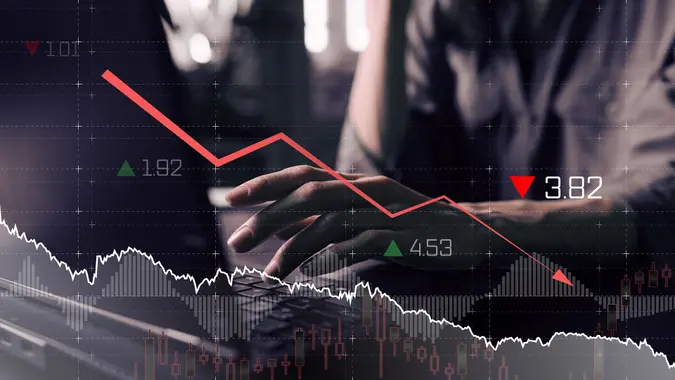Pros and Cons of Online Trading

Commitment to Our Readers
GOBankingRates' editorial team is committed to bringing you unbiased reviews and information. We use data-driven methodologies to evaluate financial products and services - our reviews and ratings are not influenced by advertisers. You can read more about our editorial guidelines and our products and services review methodology.

20 Years
Helping You Live Richer

Reviewed
by Experts

Trusted by
Millions of Readers
Online stock trading is convenient — you can buy and sell right from the comfort of your home, and you can access a wide variety of security types. It can be a viable alternative to using a traditional brick-and-mortar brokerage firm.
With online trading, or e-trading, the trader makes all decisions himself. Such an approach to trading differs from using a stockbroker, as the broker typically offers input and advice. Another difference is in the fees: Online trading is generally considerably less expensive than using a stockbroker to make trades.
Regardless of how you trade, there’s always risk online and offline — if you want to invest, you have to get over your fear of investing. To better decide whether this form of investing is right for you, understand the advantages and disadvantages of buying stocks online and online trading.
5 Benefits of Online Trading
Online trading offers unique benefits. To determine if this is one of the best investment strategies for you, check out some of the advantages. Here are five pros of online trading:
1. Lower Fees
One of the clearest advantages of online stock trading is the reduction in transaction costs and high fees associated with traditional brick-and-mortar brokerage firms. Typically, you’ll pay between $5 and $9 to buy and sell stocks and exchange-traded funds at online discount brokerages.
Finding even cheaper fees is possible thanks to companies like E-Trade and Ally Invest, formerly known as TradeKing, both of which charge $4.95 per stock trade.
Check Out: 12 Best Apps for First-Time Investors
2. More Control and Flexibility
Time is often of the essence when you trade stocks, so the speed of using online trading portals is a benefit to many investors. With online trading, you can execute a trade almost immediately.
Traditional brick-and-mortar brokers might require appointments, either online, over the phone or in person, just to initiate a trade. The time involved in such transactions is an inconvenience in the best of circumstances — and can actually cost you money in the worst scenarios.
3. Ability to Avoid Brokerage Bias
By taking trading into your own hands, you can eliminate brokerage bias. Bias sometimes occurs when a broker gives financial advice that benefits the broker — such as in the form of a commission for selling specific mutual funds and other products. This kind of biased advice can be troublesome for any investor and might even lead to investment decisions that are good for the broker but bad for you. You can avoid ethically questionable, biased broker advice by using online trading, which lets you invest without having to get advice from a broker.
Find Out: Best Small-Investment Options When You Have Less Than $500
4. Access to Online Tools
In the world of online trading, a lower cost does not necessarily mean a shoddy product. Many of today’s online trading companies offer customers an impressive suite of tools to help optimize trades.
For example, sites such as Ally Invest, Interactive Brokers and Motif offer a robust selection of tools designed to give customers immediate access to valuable information, including interactive investment performance charts.
5. Option to Monitor Investments in Real Time
Many online trading sites offer stock quotes and trade information that make it easy for people to see how their investments are doing in real time. Companies like Scottrade, for example, offer customers access to streaming data.
You get real-time quotes, stock market news and more. For some traders, this one-stop, at-a-glance convenience trumps picking up the phone and calling a live broker, turning on the television, or even going to a different website to get market information.
Check Out: Merrill Edge Review
5 Disadvantages of Online Trading
Now that you know the most enticing features online stock trading has to offer, you should also know the negative aspects of online trading so you can determine if it’s a strategy that will truly fit your needs and style. Here are five disadvantages of online trading:
1. Easier to Invest Too Much Too Fast
Because online trading is so easy — you basically push a button — there is the risk of making investment mistakes or overinvesting.
The Securities and Exchange Commission warns investors that although it takes just a nanosecond to make a trade, real investment decisions require time. Investors who aren’t used to fast-moving markets can get caught up in the excitement: Before they know what hit them, they can end up losing a lot of money.
Online investors can protect themselves by understanding the stocks they are buying and setting up safeguards in fast-paced markets. Placing a limit order on your account is one way to control what you buy and how much of it. Order limits allow you to set a specific price at which a stock will purchased.
See: The Top 10 Online Wealth Management Services
2. No Personal Relationships With Brokers
By and large, online traders are on their own. They don’t have a broker to help them navigate the uncertain waters of the stock market.
From getting help on how to create an investment strategy to understanding how the results of feedback mechanisms affect the market, online traders are left to their own devices. For some, this kind of autonomy can be unsettling.
Experts often stress the importance of research, particularly for new traders. You need to learn as much as you can about the companies in which you invest.
SEC filings are a great place to start. Public companies are required to submit detailed information to the SEC on a regular basis, including details about company finances, potential conflicts and risk factors. The public can access this information online.
3. Addictive Nature
Trading stocks can be like gambling for some people. The trader speculates on the result of something — such as a company’s performance — and then bets money that the speculation will be correct. Online traders can experience a certain high when trading that is similar to what people experience when gambling, according to a study on excessive trading published in the journal Addictive Behaviors.
4. Internet-Dependent
The nature of online trading means that, ultimately, you’re at the mercy of your internet connection. If the internet connection is too slow or is interrupted, you can lose out on a potentially important or lucrative trade.
Investors should have a backup plan in case they are cut off from the internet, according to investment research firm Zacks. Find out if your online trading firm has alternatives to making trades on the internet. Many firms allow customers to use a touch-tone phone ordering system, and others even provide live brokers to take orders.
Learn: Best Investments at Each Stage of Your Life
5. Buying Errors Due to Computer Missteps
With online trading, to simply assume a trade was not completed can cost you money. Investors who believe their trade was not completed might make the trade again and end up investing twice as much as they intended.
Check with your broker about how to verify canceled trades. Simply receiving an electronic cancellation receipt is not necessarily sufficient evidence that the trade was actually canceled.
Assuming a trade was completed without seeing confirmation is a mistake. Understand how to verify trades and review statements before you begin using an online investing system.
Up Next: 8 Online Investments That Make Portfolio Diversification Easier
Barri Segal contributed to the reporting for this article.
 Written by
Written by 

























